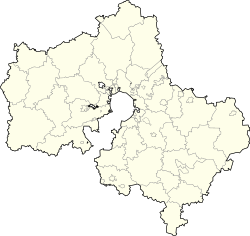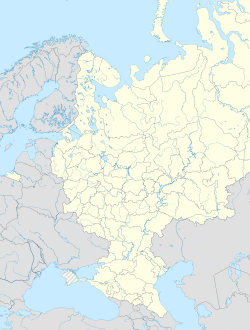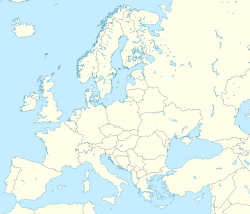You can help expand this article with text translated from the corresponding article in Russian. (March 2024) Click [show] for important translation instructions.
|
Khimki (Russian: Химки, IPA: [ˈxʲimkʲɪ]) is a city in Moscow Oblast, Russia. It is located approximately 18 kilometres (11 mi) northwest from central Moscow,[7] and is part of the Moscow metropolitan area.
Khimki
Химки | |
|---|---|
 Babakina Street in Khimki (February 2010) | |
| Coordinates: 55°53′21″N 37°26′42″E / 55.88917°N 37.44500°E | |
| Country | Russia |
| Federal subject | Moscow Oblast[1] |
| Founded | 1939 |
| Government | |
| • Mayor | Dmitry Voloshin[2] |
| Area | |
• Total | 109.81 km2 (42.40 sq mi) |
| Elevation | 180 m (590 ft) |
| Population | |
• Total | 207,425 |
| • Rank | 90th in 2010 |
| • Density | 1,900/km2 (4,900/sq mi) |
| • Subordinated to | Khimki City Under Oblast Jurisdiction[1] |
| • Capital of | Khimki City Under Oblast Jurisdiction[1] |
| • Urban okrug | Khimki Urban Okrug[3] |
| • Capital of | Khimki Urban Okrug[3] |
| Time zone | UTC+3 (MSK |
| Postal code(s)[6] | 141400-141446 |
| Dialing code(s) | +7 495, 498 |
| OKTMO ID | 46783000001 |
| Website | admhimki |
History
editOrigins and formation
editKhimki was initially a railway station that had existed since 1850 on the Moscow – Saint Petersburg Railway. The Moskva-Volga Canal was constructed between 1932 and 1937; Khimki lies on the west bank. Khimki was then officially founded in 1939.[8]
Khimki in the Battle of Moscow
editThe German attack starting the Battle of Moscow (code-named 'Operation Typhoon') began on 2 October 1941. The attack on a broad front brought German forces to occupy the village of Krasnaya Polyana (now in the town of Lobnya) to Moscow's North West. Krasnaya Polyana was taken on 30 November.[9]
Many sources state that at least one German army patrol visited Khimki. Similarly many sources state this as the closest point the Germans reached to Moscow (Khimki at the time was 8 km (4 or 5 mi), from the edge of Moscow). Among the sources stating the Germans visited Khimki the details of the date and unit involved are inconsistent and disputed. One story of events asserts a skirmish took place in Khimki on 16 October at the Leningradskoe Shosse bridge involving a German motorcycle unit,[10] but this would have been far from the main body of German forces at that time. Another account is a patrol reached Khimki around 30 November or early December before returning to its main unit without combat. The dates mentioned for this second account vary.[11] A myth[citation needed] surrounding this is that the Germans would have been able to see the Kremlin 19 kilometres in the distance from Khimki.
The Soviet Army counter offensive for "removing the immediate threat to Moscow" started on 5 December on the North-Western Front (the area around Khimki North West of Moscow). The South-Western Front and Western Fronts began their offensives on 6 December. The German forces were driven back. Moscow was never under such close land threat again during the war.
A memorial in the form of a giant tank trap is located at the "Kilometer 23" point 55°54′46.103″N 37°24′10.577″E / 55.91280639°N 37.40293806°E) of Leningradskoye Highway (the highway to St. Petersburg). The memorial is 1.8 km (1.1 mi) south east of Molzhaninovo railway station. The memorial was unveiled on 6 December 1966 as a 25th anniversary recognition of the launch of the Soviet counter offensive. This location is just short of an intersection with the Moscow–St Petersburg railway (close to where the IKEA shopping centre has since been built). This memorial and shopping centre on the Northern side of Khimki has a direct distance of 22 kilometres from Moscow city centre. At the time of the conflict this location was outside Khimki. This memorial is different to the Khimki War Memorial moved in 2007 to in Novoluzhinskoe cemetery.
Post war
editKhimki was home to several Soviet aerospace defense development centers that became the principal employers for the majority of the city population. This included R&D enterprises which designed surface-to-air missiles for S-75, S-125, S-200, S-300 Soviet air defense systems, engines for intercontinental ballistic missiles and satellite launch vehicles, and other types of equipment. For this reason, Khimki was off limits for all foreigners visiting the country, despite its location on a highway between Moscow and its major international airport.[citation needed]
In 2010 the city saw protests over the construction of the new Moscow–Saint Petersburg motorway through the Khimki Forest.[12]
The city of Khimki is adjacent to the city of Moscow, immediately beyond the Moscow Ring Road (MKAD).
Population
editPopulation: 254,748 (2019 Census);[13] 207,425 (2010 Census);[4] 141,000 (2002 Census);[14] 132,902 (1989 Soviet census);[15] 106,000 (1977); 23,000 (1939).
| Year | Pop. | ±% |
|---|---|---|
| 1926 | 2,876 | — |
| 1939 | 23,092 | +702.9% |
| 1959 | 47,800 | +107.0% |
| 1970 | 85,000 | +77.8% |
| 1979 | 117,974 | +38.8% |
| 1989 | 132,902 | +12.7% |
| 2002 | 141,000 | +6.1% |
| 2010 | 207,425 | +47.1% |
| 2021 | 257,128 | +24.0% |
| Source: Census data | ||
Politics
editUntil 2001, the head of the Khimki region was Yuri Korablin, and the vice-head was Sergei Krivorotenko. In 2001, Korablin became a deputy of the Moscow Oblast Duma, and his post was automatically taken by the vice-head. Unlike other municipalities in the Moscow Oblast, the charter of the Khimki district clearly provided for this option.[16]
In September 2003, Sergei Krivorotenko disappeared from the administration. Subsequently, a criminal case was opened against him, and on 25 July 2006, he was arrested and soon convicted.[17]
In the elections on 7 December 2003, Vladimir Strelchenko was elected to the post of head of the Khimki district (20.0% of the votes, or 15,085);[18] the vice-head was businessman Igor Belousov. Strelchenko was supported in the elections by the governor of the Moscow Oblast, Boris Gromov. The second candidate, Yevgeny Artamonov, received 16.8% of the vote (12,672).
In the 2009 elections, Vladimir Strelchenko was re-elected to the post of head of the Khimki urban district (50.4%, or 27,443). Igor Belousov also participated in the elections and scored 22.8% (12,401).
On 15 August 2012, Vladimir Strelchenko announced through the official website of the City Administration that he resigned, effective 17 August 2012. This information was confirmed by the Administration of the Governor of the Moscow Oblast.[19] Maria Kitaeva, the governor's adviser on information issues, told ITAR-TASS, "he wrote a letter of resignation of his own free will." The statement was written after Strelchenko's conversation with Sergei Shoigu. One of the reasons for the resignation of Vladimir Strelchenko was the appearance of compromising evidence on the Himkileaks website.
On 17 August 2012, First Deputy Head of Administration Oleg Shakhov was appointed acting Head of the Khimki City District, having taken this position only two days earlier - on 15 August 2012. Before this, Shakhov worked as first deputy governor of the Tula Oblast. Having defeated opposition candidate Yevgeniya Chirikova in the elections held on 14 October 2012, Shakhov became the Head of the city district.
In November 2014, Oleg Shakhov was accused of fraud of 22 million rubles, after which he wrote a letter of resignation from the post of head of the city district, which was approved by the Council of Deputies of the city district. On 10 November 2014, Vladimir Sleptsov was appointed acting head of the Khimki administration, and in December of the same year he was confirmed as head of the district administration. On 14 November 2014, deputies of the Council of Deputies of the Khimki City District elected Alexander Dryannov as the new Head of the city district.
On 2 August 2016, Vladimir Sleptsov was appointed head of the Khimki city district. On 22 September 2016, Sleptsov resigned of his own free will. First Deputy Head of Administration Dmitry Voloshin was appointed acting head of the city district. In December 2016, by decision of the Council of Deputies, Dmitry Voloshin was elected head of the Khimki city district.
Parties
editThe Council of Deputies of the Khimki urban district consists of six parties: United Russia, the Communist Party of the Russian Federation, the Liberal Democratic Party of Russia, A Just Russia, Yabloko, and Rodina.
Secretary of the local branch of the United Russia Party - Dmitry Voloshin.
First secretary of the Khimki city branch of the Communist Party of the Russian Federation - Alexey Perfilov.
Coordinator of the Khimki branch of the LDPR - Nikolai Kovtun.
Chairman of the Khimki branch of A Just Russia - Mikhail Khorsev.
Administrative and municipal status
editWithin the framework of administrative divisions, it is incorporated as Khimki City Under Oblast Jurisdiction—an administrative unit with the status equal to that of the districts.[1] As a municipal division, Khimki City Under Oblast Jurisdiction is incorporated as Khimki Urban Okrug.[3]
Economy
editThe city enjoys a great deal of commercial activity due to its location between Moscow and one of its main airports, Sheremetyevo.
As of 2015[update] some aerospace-development centers located in Khimki contribute to a program of the International Space Station. Former Soviet aerospace and defense development centers located in Khimki:
- NPO Energomash is a company which primarily develops and produces liquid propellant rocket engines.
- NPO Lavochkin is an aerospace company, a major player in the Russian space program.
- MKB Fakel is a government-owned aerospace defense corporation dedicated to development of guided surface-to-air missiles.
Khimki hosts one of the largest shopping malls in Russia, which features French chain-store Auchan and Swedish furniture-retailer IKEA.
Transportation
editKhimki station is on the Moscow-St Petersburg Railway.
Road transport includes bus and trolleybus.
Trolleybus routes
edit- 1. Ulitsa Druzhby (Friendship street) - Rodina Stadium;
- 2. Ulitsa Druzhby - Planernaya metro station;
- 3. Rodina Stadium - Planernaya metro station.
October Railway stations and platforms in Khimki
edit- Levoberezhnaya
- Khimki
- Podrezkovo
- Skhodnya
- Firsanovskaya
Gallery
edit-
Setra bus
Sport
edit- FC Khimki, association football club
- BC Khimki, basketball club
- WFC Rossiyanka, defunct women's association football club
Divided city
editKhimki
- at 1930 divided by Moscow Canal with right bank and left bank area and assigned "Levobereghnaya" (left bank) platform. The enter to M11 (Toll road) is also at left bank
- at 1961 part of the city transferred to Moscow include Khimki hospital (known as "Stravinsky clinic" in Master and Margarita)
- Some Moscow organizations remained in Khimky like Moscow State Art and Cultural University and Arena Khimky (de facto)
- Skhodnya de jure merged but not adjustment to 2014. De facto Khimki, Skhodnya and the rest areas and enclaves were special fare zone earlier and this does not cause fare and legal collisions
Twin towns – sister cities
edit- Grodno, Belarus
See also
editReferences
editNotes
edit- ^ a b c d e Law #11/2013-OZ
- ^ Главой Химок избран Дмитрий Волошин(in Russian)
- ^ a b c d Law #50/2005-OZ
- ^ a b Russian Federal State Statistics Service (2011). Всероссийская перепись населения 2010 года. Том 1 [2010 All-Russian Population Census, vol. 1]. Всероссийская перепись населения 2010 года [2010 All-Russia Population Census] (in Russian). Federal State Statistics Service.
- ^ "Об исчислении времени". Официальный интернет-портал правовой информации (in Russian). June 3, 2011. Retrieved January 19, 2019.
- ^ Почта России. Информационно-вычислительный центр ОАСУ РПО. (Russian Post). Поиск объектов почтовой связи (Postal Objects Search) (in Russian)
- ^ "Distance from Khimki to Moscow". Distance calculator. Archived from the original on November 11, 2016. Retrieved November 11, 2016.
- ^ Город Химки, Московская область(in Russian)
- ^ https://www.youtube.com/watch?v=olYUrlIfWg0 43 mins 45 secs into this "The World at War2 Episode 5"
- ^ Axis History
- ^ Axis History
- ^ "Russia halts forest highway construction as opposition grows". Chicago Tribune. August 26, 2010. Archived from the original on October 25, 2012.
- ^ Численность населения Российской Федерации по муниципальным образованиям на 1 января 2019 года(in Russian)
- ^ Federal State Statistics Service (May 21, 2004). Численность населения России, субъектов Российской Федерации в составе федеральных округов, районов, городских поселений, сельских населённых пунктов – районных центров и сельских населённых пунктов с населением 3 тысячи и более человек [Population of Russia, Its Federal Districts, Federal Subjects, Districts, Urban Localities, Rural Localities—Administrative Centers, and Rural Localities with Population of Over 3,000] (XLS). Всероссийская перепись населения 2002 года [All-Russia Population Census of 2002] (in Russian).
- ^ Всесоюзная перепись населения 1989 г. Численность наличного населения союзных и автономных республик, автономных областей и округов, краёв, областей, районов, городских поселений и сёл-райцентров [All Union Population Census of 1989: Present Population of Union and Autonomous Republics, Autonomous Oblasts and Okrugs, Krais, Oblasts, Districts, Urban Settlements, and Villages Serving as District Administrative Centers]. Всесоюзная перепись населения 1989 года [All-Union Population Census of 1989] (in Russian). Институт демографии Национального исследовательского университета: Высшая школа экономики [Institute of Demography at the National Research University: Higher School of Economics]. 1989 – via Demoscope Weekly.
- ^ "В ХИМКАХ НАХИМИЧИЛИ - Бизнес и криминал - Деловая пресса. Электронные газеты" (in Russian). www.businesspress.ru. Retrieved December 1, 2019.
- ^ Чиновник поплатился за «Звезду России», GZT.ru, 28.03.2007
- ^ "Итоги голосования на выборах Главы городского округа Химки 1 марта 2009 года" [Results of voting in the elections of the Head of the Khimki city district on March 1, 2009] (in Russian).[dead link]
- ^ "Губернатор подтвердил отставки мэров Балашихи и Химок" [The governor confirmed the resignations of the mayors of Balashikha and Khimki] (in Russian). NovostiMO. Archived from the original on April 17, 2013.
- ^ "Города-побратимы". admhimki.ru (in Russian). Khimki. Retrieved February 5, 2020.
Sources
edit- Московская областная Дума. Закон №11/2013-ОЗ от 31 января 2013 г. «Об административно-территориальном устройстве Московской области», в ред. Закона №249/2019-ОЗ от 29 ноября 2019 г. «О внесении изменений в Закон Московской области "Об административно-территориальном устройстве Московской области"». Вступил в силу на следующий день после официального опубликования (13 января 2013 г.). Опубликован: "Ежедневные Новости. Подмосковье", №24, 12 февраля 2013 г. (Moscow Oblast Duma. Law #11/2013-OZ of January 31, 2013 On the Administrative-Territorial Structure of Moscow Oblast, as amended by the Law #249/2019-OZ of November 29, 2019 On amending the Law of Moscow Oblast "On the Administrative-Territorial Structure of Moscow Oblast". Effective as of the day following the day of the official publication (January 13, 2013).).
- Московская областная Дума. Закон №50/2005-ОЗ от 22 февраля 2005 г. «О статусе и границе городского округа Химки», в ред. Закона №6/2013-ОЗ от 30 января 2013 г. «О внесении изменений в Закон Московской области "О статусе и границе городского округа Химки"». Вступил в силу со дня официального опубликования. Опубликован: "Ежедневные Новости. Подмосковье", №40–41, 5 марта 2005 г. (Moscow Oblast Duma. Law #50/2005-OZ of February 22, 2005 On the Status and the Border of Khimki Urban Okrug, as amended by the Law #6/2013-OZ of January 30, 2013 On Amending the Law of Moscow Oblast "On the Status and the Border of Khimki Urban Okrug". Effective as of the day of the official publication.).
External links
editMedia related to Khimki at Wikimedia Commons
- Official website of Khimki (in Russian)
- Khimki Business Directory (in Russian)





